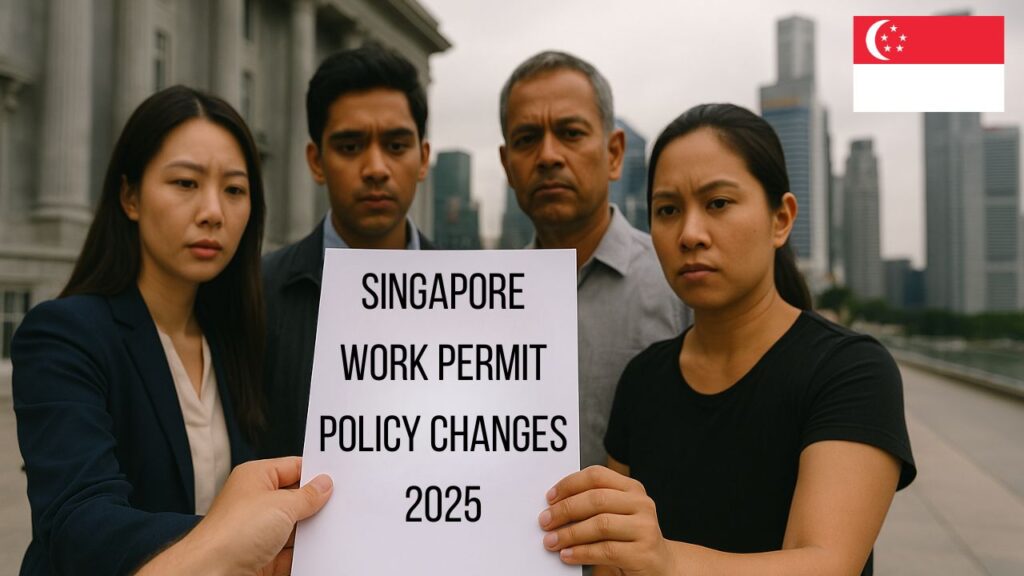Singapore’s Ministry of Manpower (MOM) has introduced major updates to its 2025 Work Permit Policy, reshaping how employers hire and manage foreign workers. The new regulations include stricter application procedures, revised documentation steps, and new age limit restrictions aimed at ensuring a sustainable and fair employment system. This change will affect thousands of work permit holders and foreign employers across key industries such as construction, manufacturing, and services. The government’s move aims to strengthen the local workforce while maintaining economic competitiveness and fair labor standards in Singapore.

New Application Steps Under Singapore Work Permit Policy
The Ministry of Manpower has streamlined the work permit application process to make it more transparent and efficient. Employers must now complete additional verification steps before approval, including document authentication and digital identity verification. This aims to prevent fraudulent submissions and improve data accuracy. Companies hiring foreign staff must register under MOM’s new Employment Portal System before proceeding with any applications. These measures ensure that every employer follows a regulated path, making the overall foreign workforce management more accountable and compliant with Singapore’s evolving employment laws.
Updated Age Limit Rules for Foreign Workers in Singapore
One of the most notable updates is the revision of age limit criteria for certain industries under the 2025 policy. Workers above 50 years of age will face new evaluation requirements depending on their occupation type and work sector. MOM has clarified that this change aims to prioritize younger, skilled applicants while still allowing experienced individuals to continue if they meet health and fitness standards. Employers must conduct yearly reviews to ensure compliance with the updated employment age rules, which take effect from March 2025.
Impact of Work Permit Changes on Employers and Workers
The 2025 policy update will bring significant implications for both Singapore employers and foreign employees. While businesses may face stricter requirements, the system is expected to create better workforce quality and reduce dependency on unskilled labor. MOM encourages companies to focus on training initiatives and local talent development to align with the nation’s productivity goals. The stricter compliance framework will enhance workplace safety and long-term career sustainability for all parties involved in the employment ecosystem.
Summary and Analysis of MOM’s 2025 Policy
Singapore’s 2025 Work Permit Policy changes reflect the government’s continuous effort to balance economic growth and workforce integrity. By enforcing stricter checks, age-based regulations, and modern application systems, MOM aims to create a transparent and future-ready labor market. These policy shifts will not only benefit local workers but also ensure that foreign manpower continues to contribute responsibly to Singapore’s development. Overall, this move reinforces the country’s commitment to fair, sustainable, and forward-looking employment practices.
| Category | New Policy Update 2025 |
|---|---|
| Application Process | Digital verification and pre-approval checks introduced |
| Age Limit | Maximum age reduced to 50 years in select sectors |
| Health Requirements | Mandatory annual medical check for all permit holders |
| Employer Registration | All employers must register under the new MOM portal |
| Implementation Date | Policy effective from March 2025 |
Frequently Asked Questions (FAQs)
1. What is the new Work Permit age limit in Singapore?
The maximum age limit is now set at 50 years for most sectors starting March 2025.
2. When will the 2025 Work Permit Policy take effect?
The new policy comes into force from March 2025.
3. Are employers required to reapply for existing workers?
Yes, renewal applications must follow the updated policy rules.
4. What is the main goal of these new MOM changes?
The aim is to improve fairness, compliance, and workforce quality in Singapore.




